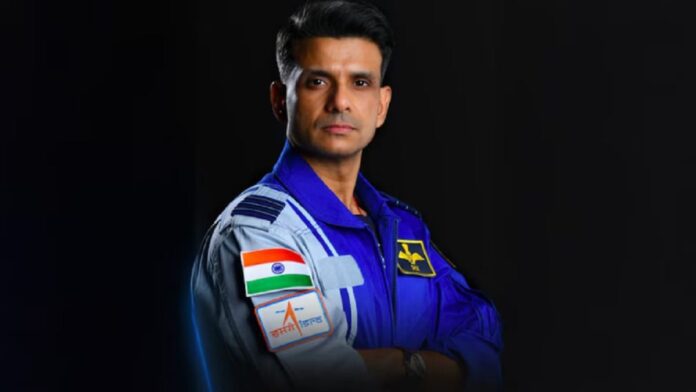INDIA: In the bustle of Delhi’s ESTIC 2025 conclave, where quantum computing, AI governance, and deep-tech sovereignty dominated discussions, a quiet but palpable shift swept through the auditorium when one particular speaker took the stage. Group Captain Shubhanshu Shukla, Indian Air Force test pilot and the first Indian astronaut to visit the International Space Station, brought with him both the prestige of national achievement and the calm authority of someone who has operated at the edge of human capability.
Shukla, the second Indian after Rakesh Sharma to fly into space, has transitioned from a fighter cockpit to the vacuum beyond Earth. His presence at ESTIC underscored a narrative that India’s scientific journey is not only accelerating but maturing. In an exclusive conversation with Transcontinental Times, he reflected on India’s growing optimism in space exploration, the discipline of preparation, and the road ahead to Viksit Bharat 2047.
Speaking about the conclave, Shukla expressed admiration for the government’s intensified focus on scientific advancement.
“I think the experience is great,” he said. “The initiative shows the interest the government and all the eminent leaders in the country have towards science and technology and the innovation they want to bring to achieve the dream of Viksit Bharat 2047.”
Also Read: From Chopin to Tagore: A Musical Bridge Between Poland and India
Calling ESTIC a very successful initiative, he added that he was “very happy to be a part of it, very happy with the excitement that was shown. I think this will grow only in strength in future chapters.” His remarks mirrored the broader ambition of the event, which brought together global policymakers, researchers, and technologists to reinforce India’s strategic deep-tech agenda.
Transitioning to his experience as an astronaut, Shukla spoke with clarity and discipline. When asked whether space felt different from what training simulations prepare astronauts for, he credited the training regimen for its ability to remove uncertainty.
“The training prepares you really well for both nominal and off-nominal situations,” he explained. “Actually, the majority of the training is for the off-nominal situation, what to do when things go wrong.”
The preparation, he said, builds psychological resilience as much as technical competence.
“There were no such surprises per se. That is what the training is for, to prepare you for a blanket of situations so that you are not caught by surprise.”
He acknowledged that unexpected scenarios can occur in space, but emphasised that the philosophy of astronaut training is designed to prepare crews to manage whatever arises.
When asked what India must strengthen before its next human space mission, Shukla spoke with measured conviction.
“India and ISRO have earned a solid reputation globally for repeatedly demonstrating that we can achieve complex missions. Human space missions are something we are following in now, and I think there is a change in mindset that is coming which is shown by having increased reliability and redundancy because human lives are involved.”
His comments indicated a shift in India’s space programme from capability demonstration to culture-building around safety and precision.
“I think there is a very good understanding, and I am confident we will be able to demonstrate this in the future,” he added.
Shubhanshu Shukla’s Message to Youth and India’s Next Space Milestone
In a message to young Indians, Shukla kept it simple but resonant.
“Dream big and stay curious. The first block is in the mind. Do not let it stop you from doing what you want to do.”
For someone who has journeyed from the skies over India to orbit around Earth, the statement carried the weight of lived experience. His trajectory from IAF test pilot to astronaut trainee under Axiom Mission 4 represents India’s expanding participation in global scientific endeavours.
Human spaceflight and India’s next milestone
India’s next major leap, the Bharat Antariksh Station scheduled for launch around 2028, is intended to secure the country’s independent long-term presence in low-Earth orbit. Designed as a modular research outpost, it will play a critical role in advancing India’s autonomy in human spaceflight beyond Gaganyaan.
Questions remain regarding timelines, indigenous readiness, and sustained funding. Shubhanshu Shukla has been linked with key responsibilities in the programme, including oversight of crew operations, astronaut training modules, habitat design, and systems development. His involvement underscores the seriousness with which India is approaching its human spaceflight future.
While optimism surrounds BAS, its success will depend on translating vision into execution, supported by engineering readiness and global collaboration. Shukla’s professional journey from Lucknow to low-Earth orbit embodies India’s aspirations for self-reliance in space science and signals confidence in the nation’s ability to sustain an orbital presence.
At a time when India is redefining its scientific identity, voices like Shubhanshu Shukla’s offer a grounded roadmap. Clear, measured, and forward-looking, his reflections remind us that the country’s greatest strength often lies in those who work quietly and rigorously to turn the impossible into the inevitable.
Also Read: Jayant Khobragade Takes Charge as India’s New Ambassador to Spain
